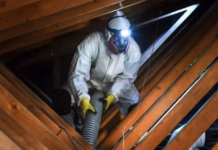In the bustling world of commerce, maintaining a pest-free environment is paramount. From food service establishments to office buildings, the presence of pests can not only tarnish reputations but also pose serious health risks and regulatory issues. To combat this persistent challenge, businesses must adopt proactive strategies and employ the best commercial pest control services available. Here are some important tips to ensure your premises remain pristine and pest-free.
Regular Inspections:
Regular inspections are the cornerstone of effective pest control. Schedule routine inspections by trained professionals to identify potential entry points, nesting areas, and signs of pest activity. Early detection allows for swift intervention, preventing infestations before they escalate.
Integrated Pest Management (IPM):
Implement an Integrated Pest Management (IPM) approach, which combines proactive measures such as sanitation, exclusion, and monitoring with targeted pesticide applications when necessary. IPM emphasizes prevention over reliance on chemical treatments, promoting long-term pest control solutions while minimizing environmental impact.
Meticulous Sanitation Practices:
Maintaining impeccable cleanliness is key to deterring pests. Regularly clean and sanitize all areas of your premises, paying special attention to kitchens, storage areas, and waste disposal sites. Additionally, invest in professional mould cleaning services to mitigate moisture issues that attract pests and contribute to mould growth.
Sealing Entry Points:
Pests can exploit even the tiniest cracks and crevices to gain access to your premises. Seal all entry points, including gaps around doors and windows, utility penetrations, and vents. Use durable materials such as steel wool, caulk, and weather stripping to block potential entryways and prevent pests from infiltrating your property.
Proactive Pest Monitoring:
Deploy monitoring devices such as traps, bait stations, and pheromone traps to detect pest activity early. Regularly inspect these devices and analyze captured pests to identify trends and potential hotspots. Proactive monitoring allows for timely intervention and prevents infestations from taking hold.
Employee Training and Awareness:
Educate your employees about the importance of pest control and their role in maintaining a pest-free environment. Train staff to recognize signs of pest activity, report sightings promptly and adhere to sanitation protocols. Foster a culture of vigilance and collaboration to ensure everyone contributes to pest prevention efforts.
Professional Pest Control Services:
Partner with reputable commercial pest control companies with experience in your industry. Choose firms that specialize in integrated pest management and employ certified technicians trained in the latest pest control techniques. Collaborate closely with your pest control provider to develop customized treatment plans tailored to your specific needs and challenges.
Documented Pest Control Plan:
Develop a comprehensive pest control plan outlining preventive measures, treatment protocols, and response procedures. Document all pest control activities, including inspections, treatments, and corrective actions taken. Regularly review and update the plan to reflect changes in pest pressure, facility layout, or business operations.
Environmental Considerations:
Prioritize environmentally friendly pest control methods whenever possible. Opt for non-toxic baits, mechanical traps, and biological controls to minimize harm to non-target organisms and ecosystems. Embrace sustainable practices that align with your commitment to corporate social responsibility and environmental stewardship.
Continuous Improvement:
Pest control is an ongoing process that requires vigilance and adaptability. Continuously evaluate the effectiveness of your pest management efforts and identify areas for improvement. Solicit feedback from employees, customers, and pest control professionals to refine your strategies and stay ahead of emerging pest threats.
Effective commercial pest control requires a multifaceted approach that encompasses prevention, monitoring, and intervention. By implementing the aforementioned tips and working closely with experienced pest control professionals, businesses can create a safe, hygienic environment that promotes productivity and customer satisfaction. Remember, when it comes to pest control, prevention is always better than cure.




